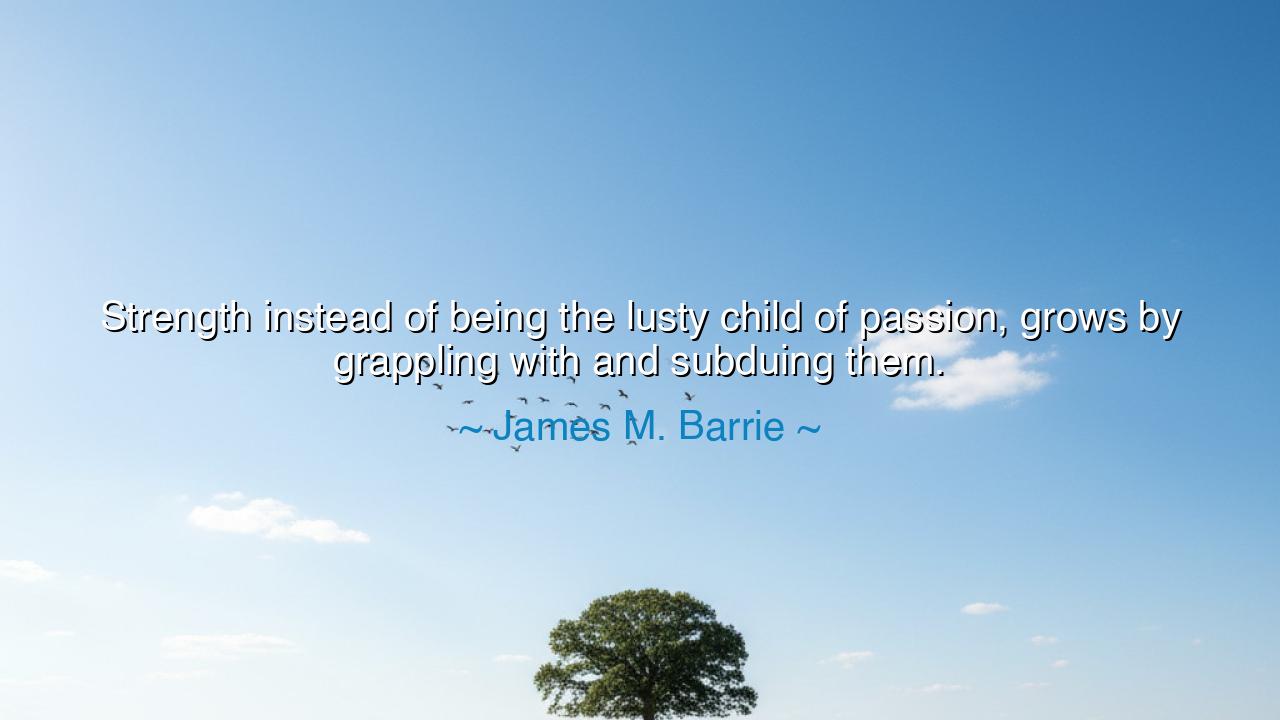
Strength instead of being the lusty child of passion, grows by
Strength instead of being the lusty child of passion, grows by grappling with and subduing them.






The words of James M. Barrie pierce with the wisdom of restraint: “Strength instead of being the lusty child of passion, grows by grappling with and subduing them.” In this saying lies a truth as deep as the roots of mountains: that true power is not born of wild fire, but of the steady hand that learns to master the flames. Passion, unbridled, rages like a tempest, consuming all in its path. But when harnessed, when brought under discipline, it becomes the forge in which strength is tempered.
It is easy for men to confuse passion with strength. Passion roars, it burns, it surges with the appearance of power. It feels alive, irresistible, even heroic. Yet it is unstable—today it fights for love, tomorrow it fights for anger, and the next day it destroys the very vessel that holds it. Barrie reminds us that strength is not the child of passion’s outburst, but of the struggle against it. It is the man who tames his temper, the woman who conquers despair, the soul who resists greed—these are the truly strong.
The ancients tell us this through the tale of Odysseus, who endured trials not only of monsters and storms but of his own heart’s temptations. Many times his passion urged him—toward reckless pride, toward alluring distractions, toward despair. Yet his greatness lay not in yielding, but in resisting, in binding himself to the mast to withstand the Sirens’ song. His journey home was not only across the seas, but across the battlefield of his own soul. His victory was not the roar of passion but the calm mastery of it.
History offers us too the example of Mahatma Gandhi. His enemies struck with violence, and many counseled him to answer with the same fire. But Gandhi subdued passion’s cry for vengeance, choosing instead the harder path of nonviolence. His strength did not come from lusty bursts of anger but from patient endurance, from the grappling of spirit against the easy temptation of wrath. By mastering passion, he gained a force stronger than any weapon—the strength to move nations.
This quote teaches us that strength is not raw emotion, but disciplined spirit. It grows not by indulging passion, but by wrestling it into silence until it serves the higher purpose of the soul. The soldier who masters his fear, the leader who governs his pride, the parent who restrains their anger—these are the conquerors greater than kings. For he who subdues himself has subdued the most dangerous of foes.
The lesson, then, is clear: do not mistake passion for strength. Passion is the storm; strength is the sailor who steers through it. Passion is the fire; strength is the blacksmith who bends it to his will. Your task in life is not to kill passion but to master it, to transform it into a servant rather than a master. Through this discipline, greatness is born.
Practical action lies in daily practice. When anger rises, pause and breathe; in that pause is the seed of mastery. When desire tempts, remember the greater path you walk; in that remembrance is strength. When fear whispers, take one step forward anyway; in that step lies victory. Each time you resist, each time you subdue, your strength grows—not as the fleeting fire of passion, but as the enduring flame of the spirit.
So let Barrie’s words be carried as counsel: true strength is not wild, but wise; not lusty, but tempered. It is born not of passion unleashed, but of passion conquered. Seek this strength, and you will become like the oak—unshaken by storms, rooted deep, rising high, not because the winds are absent, but because you have mastered their force.






AAdministratorAdministrator
Welcome, honored guests. Please leave a comment, we will respond soon